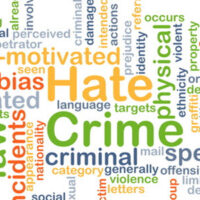Changes to Hate-Crime Standards

Getting a conviction for a hate-crime, along with the associated stricter penalties, just got a lot easier in Maryland. If you are charged with a hate-crime, you are looking at some pretty serious sentences, as the hate crime designation increases incarceration lengths and fines above those associated with typical convictions. The best thing you can do now is get an experienced criminal defense attorney working on your behalf.
What is a Hate Crime?
A hate/bias incident is an act of aggression or hostility that is directed against a protected class, but is not actually a criminal act. Examples might be displaying objectionable hate items in one’s own car or yard, expressing racial epitaphs, or passing out hate literature in public. However, when a criminal action is committed with the intent of hurting or threatening someone or damaging their property based on certain factors, it is considered a hate crime. Actions such as burning someone’s property or participating in physical violence are criminal, and constitute hate crimes when motivated by hatred based on protected considerations. Those protected factors include homelessness, sexual orientation, religion, gender identity, race, national origin, color, disability, and gender. As of October 2020, demonstrating that hate motivated the crime got significantly easier.
Collins’ Law
HB917/SB606 addresses the legal standard for determining whether or not a crime was motivated by hate. Previously, prosecutors had to prove that criminal activity was wholly motivated by one of the factors listed above. The legal update changes that standard, applying now to crimes that may be motivated in substantial part on said factors. It was created in response to the 2017 murder of a Black university student. Although the accused was convicted of the murder, prosecutors were unable to prove racial hate motivation because particular slurs were not used. So while the perpetrator was a proven racist, based on memes found on his phone and Facebook likes, it could not be proven that the stabbing attack that occurred was wholly motivated by race. Now the burden of proof on prosecutors will be significantly easier to reach.
Motivations Behind Hate Crimes
The majority of hate crimes—two-thirds, in fact—are motivated by the desire to experience a little excitement. Research indicates that more than 90 percent of offenders don’t even know their victims. Other crimes are justified in the mind of the assailant as defensive—that is, the perpetrator believes he or she is protecting the community from unwanted categories of people. In roughly eight percent of crimes, perpetrators are retaliating against a class of people based on a previously occurring event (such as crimes against Muslims after the 9-11 attack). Finally, roughly one percent of hate crimes are committed by individuals who have a well- articulated mission to address a particular group with criminal intent.
Your Criminal Defense
Regardless of the charges you face, you are entitled to thorough defense in this country. At The Law Office of Hammad S. Matin, P.A., you will get nothing less. Schedule a confidential consultation with a La Plata & Waldorf criminal defense attorney in our office today.
Resource:
marylandattorneygeneral.gov/CivilRights%20Documents/HCP.pdf

